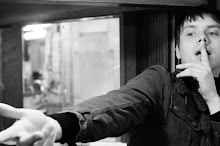Konya
Coming here was something I'd wanted to do for a while. Konya was the capital of the Seljuk Sultanate of Rum, and hence many 13th Century Seljuk buildings remain - most importantly, the mausoleum of my favourite poet, Jelalludin al Rumi (Mevlana).
The bus ride took 7 hours. The landscape: steppe and snow capped mountains, occasionally a city of identical bright-coloured cheap lowrise. The guy I happened to sit next to happened to speak pretty good English. Hasan was studying International Relations at the university of Konya. He wanted to move to the West, then come back and work for the Turkish government. A very patriotic Turk, he wanted to help his country modernise.
Hasan asked if I wanted to stay at his house, which was 25km from the centre of Konya. Luckily, I agreed. As a consequence, I got to hang out with a bunch of young Turkish guys, drink fine Turkish tea, and eat Hasan's mother's kick-arse börek (spinach, cheese pastry). The house was pretty much the last of a series of high rises on the very outskirts of Konya. The whole place is a student city. The univeristy has 70,000 students. The campus itself includes a huge food court, shopping mall and a restaurant where 200 people were gathered in front of a huge TV screen to watch soccer.
The guys were especially proud of the nearby Hilton hotel's modern shopping mall. All the youth there seemed very westernised - lots of peroxide and jeans. But the metal detectors and armed guards gave a very different spin on the phenomonon.
The next day, I got up and caught a clapped out minibus to the centre. I love this institution - the driver changes gears with the same hand that he hands out change for the ride. Konya was pretty disappointing though. The Seljuk architecture is too heavy for my taste. Rumi's mausoleum was way too touristy, with people heckling tourists for all sorts of services. Probably the coolest thing there was the illuminated manuscript collection and a box with Muhammed's beard. One has to wonder why the Konya exists. It's in the middle of a barren waste. The social conservatism is apparent with many old men wearing beards, and some women in hejab with only eyes showing. Still, these people were as friendly as anywhere else in Turkey.


0 Comments:
Post a Comment
<< Home